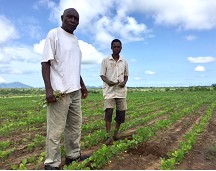Speeches Shim
FEED THE FUTURE MOZAMBIQUE INNOVATIONS (FTF INOVA) ![]() (pdf - 210k)
(pdf - 210k)
Overview
USAID has worked closely for years with partners such as private sector companies and associations, civil society organizations, and the Government of the Republic of Mozambique (GRM) to increase investment and incomes in the agriculture sector. The GRM has set forth an ambitious agenda to increase equitable, pro-poor agricultural growth and sustainably reduce poverty and hunger. Aligned with GRM’s vision, USAID’s FTF Inova provides the framework for ensuring that successes in Mozambique’s agricultural sector are enduring, that market actors are resilient, and that women benefit from growth in the agricultural sector. FTF Inova will therefore build the capacity of, and facilitate linkages between, private and public sector actors to create more effective and competitive value chains in priority sectors—groundnut, sesame, soybean, common bean, cowpea, pigeon pea, banana, and cashew. Underpinning these investments is a system composed of Mozambican stakeholders who are poised to support private sector-led agricultural growth, investment, innovation, and women’s empowerment.
Program Description
FTF Inova will increase the competitiveness of selected value chains, expand the number of enterprises that can compete and upgrade their products and services, and improve relationships and linkages between those firms and other market participants throughout the value chain. Project activities will produce a “ripple effect” of continual upgrading in the private sector through spontaneous replication and investment which will lead to the sustainable reduction of poverty and hunger. The project will use a portfolio approach which values diversified investment, active monitoring of investment performance, and periodic rebalancing of investments to optimize returns. The project will use a combination of a strategic investment fund and technical assistance to reduce the perceived risk of investing in agriculture and testing new business models for farmers and agribusinesses.
Expected Results
Selected results for the pigeon pea value chain:
- $10 million increase in the sale of pigeon pea for a total of 20,000 farmers;
- 30% increase in productivity; and;
- 35% increase in women’s participation.


Comment
Make a general inquiry or suggest an improvement.